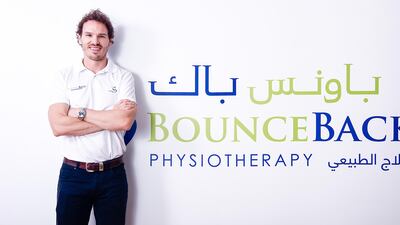A new saliva test to indicate possible concussion during rugby matches could help protect scores of young players from life-changing brain injuries, experts have said.
Players and coaches in the UAE have welcomed the research by the University of Birmingham, in the UK, and claim a wider understanding of the long-term damage of sports-related head injuries is crucial for the future safety of contact sports, such as rugby.
Biomarkers present in saliva and urine of players can indicate if a brain injury has occurred, and, if validated, could be done on a handheld device currently under development, to give an accurate pitch-side diagnosis.
_______________
Read more:
Better safe than sorry: Former UAE player-turned-medical educator preaches caution on head injuries
_______________
Former UAE fullback Tim Fletcher now runs BounceBack Physiotherapy and provides medical services for Abu Dhabi Saracens.
“In my experience you don’t always spot a concussion immediately, and play can continue on occasion,” he said.
“There is still an old school way of thinking that if the player can stand up and tell you their name, they are good to continue playing.
“If this development is successful, it is certainly interesting as the biomarkers in saliva could show consistency and take the objectivity out of the situation. There is not even a chance of cheating the system.”
Current concussion protocols lead medical staff to remove a player from the pitch if they are suspected of suffering a concussion.
They are then asked a series of “Maddox” questions to assess their memory and coherence.
It helps coaches recognise signs of a concussion injury, asking questions that players cannot learn answers to as they are continuously changing.
Questions could be: who scored the first try of a match, what’s a certain player’s shirt number, who the team played the previous weekend or what half the game is currently in.
Agitation, confusion, headaches, memory loss, lethargy and dizziness are all signs of concussion.
“It is difficult for coaches and support staff as the background knowledge on head injuries is in the learning stage, especially in the UAE,” Mr Fletcher said.
“It can be difficult, as most guys want to get back on the pitch as quickly as possible. “Coaches need to explain the situation very quickly about why they are being withdrawn.
_____________________
Read more:
Concerns over whether Sonny Bill Williams should have had concussion test
UAE rugby stars keep distance from sport years after career-ending concussions
Doctors urge greater awareness of concussions
_____________________
“I regularly speak with the Abu Dhabi Saracens players so they know why we are asking the questions during a game, should they be taken off the pitch.”
The study is part of the University of Birmingham’s Repetitive Concussion in Sport (RECOS) project, and will run throughout the 2017/18 season of professional rugby in England.
Researchers led by Professor Tony Belli at the College of Medical and Dental Sciences have developed a test over the past nine years.
It is hoped it could be used at grassroots level, schools and in the professional game if further trials are a success.
The handheld device could also be used by frontline medics and the military to improve diagnosis and treatment in the first critical hour of a brain trauma.
Former UAE national team Sevens player, Jonny Macdonald, was forced to retire from rugby in 2014 after suffering three successive concussions in just two months while playing.
Born and raised in Abu Dhabi, he represented the Arabian Gulf at the Sevens World Cup in 2009, and Scotland at the Hong Kong Rugby Sevens.
He estimates that he has suffered anywhere between 15 and 20 concussions during his career, and has had more than 50 brain scans.
“If the science holds up and the biomarkers are definitive, this saliva test could help the game enormously and stop repeat injuries, where a lot of the damage occurs,” he said.
“If it’s not exclusive to the top level and is affordable for schools and amateur clubs, that would be a big breakthrough.
“On occasion, if a doctor makes an assessment on the side-lines here, a player often says he is OK to continue and returns to the field.
“This would give a definitive answer and remove that element of doubt. The referee could then make the decision and take it out of the hands of the player.”
Changes to the game for concussions brought in in England for this season include a mandatory 10-minute minimum break for a player, rather than a side-line assessment by a doctor that could see them back on the pitch after two minutes.
Shoulder-high tackles are also now outlawed in the game globally, and result in an immediate red card to help reduce head collisions and dangerous play.
According to the England Rugby Football Union, concussion remains the most commonly reported injury in the Premiership there, accounting for almost half of all injuries sustained by the tackler.
Concussion has been the most common injury for five consecutive seasons, accounting for 20 per cent of injuries by the ball carrier and 47 per cent for the tackler.
“People generally are uneducated about head injuries in sport but at least it is now on the agenda,” Mr Macdonald added.
“Repeat concussion can have a long-term effect. People should play rugby but they need to do so in a safe environment.”



